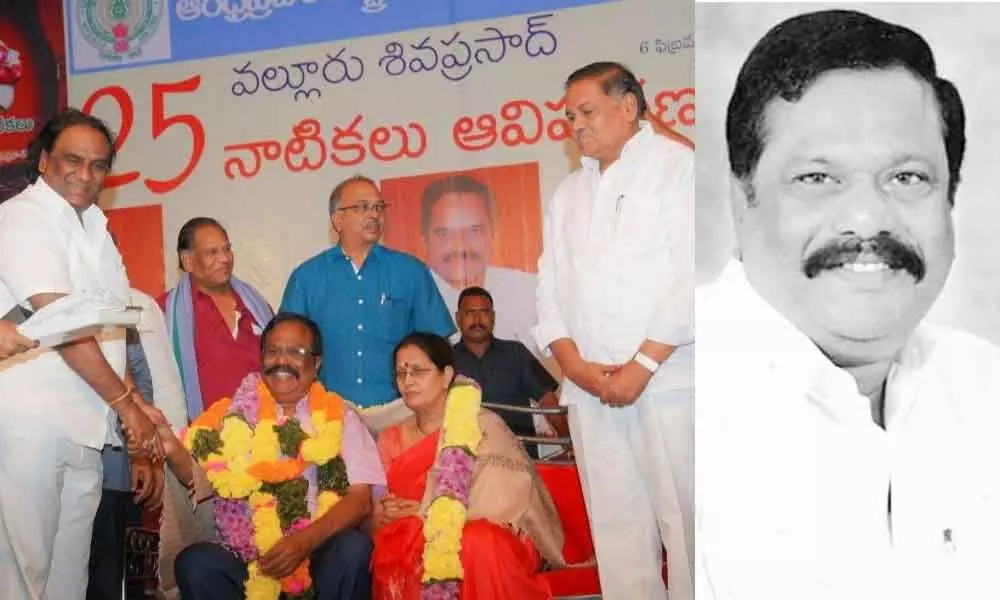Live
- Anupama graces Vogue India’s January-February cover
- Captivating poster from ‘Shambhala’ unveiled
- DMK desperately trying to counter BJP‘s rise in TN: ANS Prasad
- Cyber Crimes Surge by 18% in 2024: Director Shikha Goel Reports
- BGT: We are seeing a master at work; I take my hat off to him, says Abbott on Bumrah
- Niranjan Reddy Slams Jupally Krishna Rao and Government Over Irrigation Incompetence
- Gardner reflects on Australia's dominant year after ODI series sweep over NZ
- Pushpa Producer Naveen Yerneni Donates Rs. 50 Lakhs to Family of Victim in Sandhya Theater Incident
- NC MP holds anti-reservation protest outside J&K CM’s residence
- Inflation burden eases for farm and rural labourers
Just In
Vijayawada: State needs cultural policy for survival of art, feels writer Valluru


Siva Prasad receiving lifetime achievement award (Left); Valluru Siva Prasad (Right)
“I had been to Kerala with my wife Krishna Kumari and there I saw the traditional and contemporary art forms are showcased regularly three shows in a theatre
Vijayawada: "I had been to Kerala with my wife Krishna Kumari and there I saw the traditional and contemporary art forms are showcased regularly three shows in a theatre. I purchased tickets to enter into that auditorium to witness the show.
After the show, I met the artistes and came to know that the government is arranging the shows regularly in different places to safeguard their culture and tradition as per the State cultural policy. All the artistes participating in that show are having their own profession and they were also paid for their participation in the show. Unfortunately, till now we don't have any 'cultural policy' to our state. Unless there is a policy, no art will survive," said eminent writer Valluru Siva Prasad.
'The Hans India' had a chat with Valluru Siva Prasad about the stages in Telugu drama.
Valluru Siva Prasad was born in 1955 in Kolakaluru village of Guntur district to Venkateswara Rao and Sarojini Devi. Several intellectuals and artistes like Valour Venkatramayya Chowdary, T Nageswara Rao, Modukuri Johnson, Bhimavarapu Narasimha Rao and Daya Chari were born in that small village.
Siva Prasad had the influence of his close relative and artiste Valluru Venkatramayya Chowdary to become an artiste. Though Siva Prasad acted in some plays, he has become more famous as writer than artiste. He worked as paramedical officer in the Leprosy department connected to the Health Ministry.
While discussing the sequence of evolution of drama, Siva Prasad said that the drama has shaped according to the needs and tragedies of the public. He further said that before Independence, to activate the public for the freedom movement, writers made such scripts during those days.
To curb the social evils like 'Kanya Sulkam' (selling girls to perform marriage), prostitution, consumption of alcohol and untouchables, many dramas were written. Siva Prasad said that the script writers like Gurajada Appa Rao (Kanya Sulkam), Kallakuri Narayana Rao (Madhu Seva, Chintamani), Sobhanadri Ramanujarao (Rangoon Rowdy) were made the dramas with the intention to save society from those social evils.
"After Independence, the writers have started writing dramas on the exploitation of labour and their rights and also subjects related to Zamindari system. Sunkara Satyanarayana and Vasireddy Bhaskara Rao wrote 'Maa Bhoomi'. According to my analysis, the writers have chosen the subjects to give some message cum solution for the problem of society.
The next phase has started with the entry of Atreya. He started exposing the middleclass society problems in his dramas like NGO, Kappalu, Parivarthana. On the same lines Anisetty (Galimedalu), Buchibabu, Pinisetty, Korrapati Gangadhara Rao have sketched the problems and aspirations of the middleclass and lower middleclass segment in their scripts. The subject of the play 'Alli mutha' of Kopparapu Subbarao is still in vogue in the present society.
These types of writings were named as 'realistic' dramas. Many plays have come with the influence of Ibsen, who brought revolution in world theatre. During this phase only some of the writers like Bhamidipati Kameswara Rao, Prakhya Sri Ramamurthy, Gollapudi Maruthi Rao, D Prabhakar, DV Narasa Raju, NR Nandi were aptly translated the western plays into Telugu. Next stage of Telugu drama witnessed the experimental dramas like Maro Mohenjo Daro (NR Nandi), Lavalo Erra Gulabi (Gollapudi), Adavi diviteelu (Vangapandu), Attili Krishna Rao (Tuurpu rekhalu), and Ganesh Patro (Koduku Puttala). This trend is still continued in the Telugu stage," said Siva Prasad.
Recollecting his entry into this script making Siva Prasad said that when he was studying 10th class, the first play "Yedari Bratukulu" came into light with the support of his Telugu teacher Venkateswara Rao. Siva Prasad wrote about 40 plays like Vana prastham, Maya, Edu gudesala palle, Bahujana hitaya, Intinti Ramayanam, Sri Chakram, Himsadwani, Edari koyila, Missed call, Dhwamsa Rachana, Kshatagaatra gaanam, Oka Maha patanam, Padugu, Ranke, Madhuparkalu.
He said that all his concepts were born from the problems that arise in society and the reason all his dramas were well connected to the audience and bagged a number of awards to the team as well as to him personally. Some of his writings for children were also staged and received appreciation from the public.
A special mention was made by Siva Prasad about the dramas penned on the problems of handloom weavers. Siva Prasasd, Padala and Soma Sekhara Rao brought excellent scripts duly exposing the difficulties faced by the handloom weavers.
While concluding Siva Prasad commented that most of the present scripts are based to attract the audience and judges to get awards. Because of this reason these dramas are not remembered by the spectators for a long time.
Siva Prasad anticipated that the government would look into the problems of cultural field and "frame cultural policy" for our State to protect the culture and heritage of Andhra Pradesh after the Covid-19.

© 2024 Hyderabad Media House Limited/The Hans India. All rights reserved. Powered by hocalwire.com






